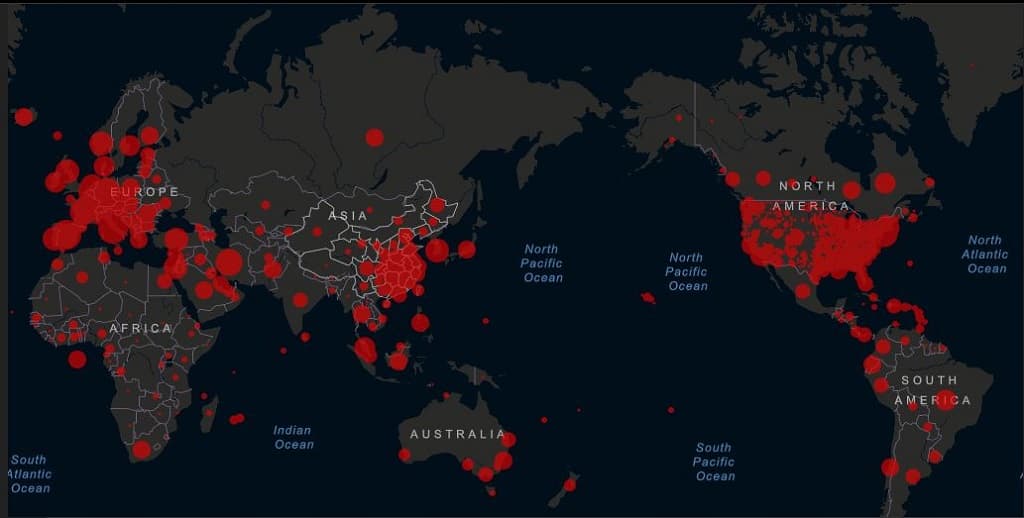Columbia University is at the frontier between AI and biotech, especially in coronavirus research. Two graduates of the Data Science Institute (DSI) at Columbia University – Andrew Satz and Brett Averso – are using AI in coronavirus research, relying on computational design to accelerate the discovery of treatments for the coronavirus.
Andrew Satz and Brett Averso are Chief Executive Officer and Chief Technology Officer, respectively, of EVQLV, a startup creating algorithms capable of computationally generating, screening, and optimizing hundreds of millions of therapeutic antibodies. They apply their technology to discover treatments most likely to help those infected by the virus responsible for COVID-19. The machine learning algorithms rapidly screen for therapeutic antibodies with a high probability of success.
Conducting antibody discovery in a laboratory typically takes years; it takes just a week for the algorithms to identify antibodies that can fight against the virus.
Expediting the development of a treatment that could help infected people is critical according to Satz, who is a 2018 DSI alumnus and 2015 graduate of Columbia’s School of General Studies.
“We are reducing the time it takes to identify promising antibody candidates,” says Satz. “Studies show it takes an average of five years and a half-billion dollars to discover and optimize antibodies in a lab. Our algorithms can significantly reduce that time and cost.”
Speeding up the first stage of the process—antibody discovery—goes a long way toward expediting the discovery of a treatment for COVID-19. After EVQLV performs computational antibody discovery and optimization, it sends the promising antibody gene sequences to its laboratory partners.
Laboratory technicians then engineer and test the antibodies, a process that takes a few months thanks to AI, as opposed to several years. Antibodies found to be successful will move onto animal studies and, finally, human studies.

Given the international urgency to combat the coronavirus, Satz says it may be possible to have a treatment ready for patients before the end of 2020.
“What our algorithms do is reduce the likelihood of drug-discovery failure in the lab,” he adds. “We fail in the computer as much as possible to reduce the possibility of downstream failure in the laboratory. And that shaves a significant amount of time from laborious and time-consuming work.”
Averso, who is also a 2018 DSI alumnus, says some of the antibodies EVQLV is designing are intended to prevent the coronavirus from attaching to the human body. “The right-shaped antibodies bind to proteins that sit on the surface of human cells and the coronavirus, similar to a lock and key. Such binding can prevent the proliferation of the virus in the human body, potentially limiting the effects of the disease.”
He also noted that the scientific community and the biotech industry are galvanized to forge collaborations that bring about therapeutics, diagnostics, and vaccines as quickly as possible.
RELATED ARTICLES: COVID-19: Link with Air Pollution? Italy’s and China’s Experience |Coronavirus and the Rise of China |Mismanagement of the Coronavirus emergency and the Italian Model |How to Get your workplace ready for Coronavirus – WHO Rules |
EVQLV collaborates with Immunoprecise Antibodies (IPA), a company focused on the discovery of therapeutic antibodies. The collaboration will accelerate the effort to develop therapeutic candidates against COVID-19.
EVQLV will identify and screen hundreds of millions of potential antibody treatments in only a few days—far beyond the capacity of any laboratory. IPA will produce and test the most promising antibody candidates.
Satz and Averso, who met while students at DSI, are deeply committed to using “data for good.” The pair have worked together for several years at the intersection of data science and health care and formed EVQLV in December 2019 to use AI to accelerate the speed at which healing is discovered, developed, and delivered.
The company has already grown to 12 team members with skills ranging from machine learning and molecular biology to software engineering and antibody design, cloud computing, and clinical development.
Both DSI graduates typically put in 100-hour workweeks because they are passionate about and committed to using data science to “help heal those in need.”
“We are building a company that sits at the frontiers of AI and biotech,” Satz says. “We are hard at work accelerating the speed at which healing is discovered and delivered and could not ask for a more fulfilling mission.”
In the picture: The map of Covid-19 spread. Photo Credit: John Hopkins University










